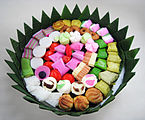|
Kolak (food)
Kolak (or kolek) is an Indonesian sweet dessert based on palm sugar or coconut sugar, coconut milk, and pandanus leaf (P. amaryllifolius).[1] A variation in which banana is added, is called kolak pisang or banana kolak. Other variations may add ingredients such as pumpkins, sweet potatoes, jackfruit, plantains, cassava, rice balls, tapioca pearls, and kolang-kaling (aren palm fruit).[2] It is usually served warm or at room temperature, but some prefer it cold. In Indonesia, kolak is a popular iftar dish,[1] locally known as tajil (sugary snacks and drinks consumed to break the fast) during the holy month of Ramadan,[2] and is also a popular street food. PreparationKolak is basically a dessert based on a sweet liquid made from the mixture of palm sugar and coconut milk. Blocks of palm sugar are crushed and liquified in boiling water, mixed together with coconut milk and pandanus leaf to add aroma. Additional fillings are added and boiled together in this hot sweet liquid. Popular kolak contents including sliced banana, diced sweet potato, ground sweet potato balls, diced pumpkin, jackfruit, and aren palm fruit locally known as kolang-kaling.[2] Traditionally kolak served warm right after it was cooked and ready, or at room temperature. However, some variant might add ice cubes as sweet cold dessert according to individual preferences. VariantsThese are variants of kolak. Sometimes a combo is presented in a serving, for example kolak pisang that contains slices of banana is often combined with diced sweet potato and kolang-kaling sugar palm fruit. Some recipes might add tapioca pearls.
Gallery
See also
References
External linksWikimedia Commons has media related to Kolak.
|
||||||||||||||||||




